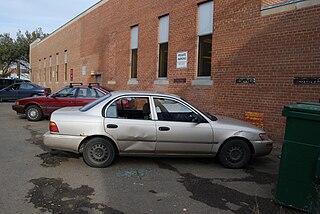
Identity theft occurs when someone uses another person's personal identifying information, like their name, identifying number, or credit card number, without their permission, to commit fraud or other crimes. The term identity theft was coined in 1964. Since that time, the definition of identity theft has been statutorily defined throughout both the U.K. and the U.S. as the theft of personally identifiable information. Identity theft deliberately uses someone else's identity as a method to gain financial advantages or obtain credit and other benefits, and perhaps to cause other person's disadvantages or loss. The person whose identity has been stolen may suffer adverse consequences, especially if they are falsely held responsible for the perpetrator's actions. Personally identifiable information generally includes a person's name, date of birth, social security number, driver's license number, bank account or credit card numbers, PINs, electronic signatures, fingerprints, passwords, or any other information that can be used to access a person's financial resources.
The Uniform Crime Reporting (UCR) program compiles official data on crime in the United States, published by the Federal Bureau of Investigation (FBI). UCR is "a nationwide, cooperative statistical effort of nearly 18,000 city, university and college, county, state, tribal, and federal law enforcement agencies voluntarily reporting data on crimes brought to their attention".

Motor vehicle theft is the criminal act of stealing or attempting to steal a motor vehicle. Nationwide in the United States in 2020, there were 810,400 vehicles reported stolen, up from 724,872 in 2019. Property losses due to motor vehicle theft in 2020 were estimated at $7.4 billion. There were 505,100 car thefts in the EU in 2019, a 43% decrease from 2008.

Carjacking is a robbery in which the item taken over is a motor vehicle. In contrast to car theft, carjacking is usually in the presence and knowledge of the victim. A common crime in many places in the world, carjacking has been the subject of legislative responses, criminology studies, and prevention efforts. Commercial vehicles such as trucks and armored cars containing valuable cargo are common targets of carjacking attempts. Carjacking usually involves physical violence to the victim, or using the victim as a hostage. In rare cases, carjacking may also involve sexual assault.
Insurance fraud is any act committed to defraud an insurance process. It occurs when a claimant attempts to obtain some benefit or advantage they are not entitled to, or when an insurer knowingly denies some benefit that is due. According to the United States Federal Bureau of Investigation, the most common schemes include premium diversion, fee churning, asset diversion, and workers compensation fraud. Perpetrators in the schemes can be insurance company employees or claimants. False insurance claims are insurance claims filed with the fraudulent intention towards an insurance provider.

The National Crime Information Center (NCIC) is the United States' central database for tracking crime-related information. The NCIC has been an information sharing tool since 1967. It is maintained by the Criminal Justice Information Services Division (CJIS) of the Federal Bureau of Investigation (FBI) and is interlinked with federal, tribal, state, and local agencies and offices.
VIN etching is a countermeasure to motor vehicle theft, that involves etching a vehicle's VIN onto its windows to reduce the value of a stolen vehicle to thieves. VIN etching is sometimes overpriced and aggressively marketed by car dealers.

An immobiliser or immobilizer is an electronic security device fitted to a motor vehicle that prevents the engine from being started unless the correct key is present. This prevents the vehicle from being "hot wired" after entry has been achieved and thus reduces motor vehicle theft. Research shows that the uniform application of immobilisers reduced the rate of car theft by 40%.

Crime in South Africa includes all violent and non-violent crimes that take place in the country of South Africa, or otherwise within its jurisdiction. When compared to other countries South Africa has notably high rates of violent crime and has a reputation for consistently having one of the highest murder rates in the world. The country also experiences high rates of organised crime relative to other countries.
Property crime is a category of crime, usually involving private property, that includes, among other crimes, burglary, larceny, theft, motor vehicle theft, arson, shoplifting, and vandalism. Property crime is a crime to obtain money, property, or some other benefit. This may involve force, or the threat of force, in cases like robbery or extortion. Since these crimes are committed in order to enrich the perpetrator they are considered property crimes. Crimes against property are divided into two groups: destroyed property and stolen property. When property is destroyed, it could be called arson or vandalism. Examples of the act of stealing property is robbery or embezzlement.
Ernest Varacalli, or "Junior", is a New York mobster who belongs to the Genovese crime family, one of the five New York crime families. Varacalli has used as many as nine different aliases during his criminal career.

Financial crime is crime committed against property, involving the unlawful conversion of the ownership of property to one's own personal use and benefit. Financial crimes may involve fraud ; theft; scams or confidence tricks; tax evasion; bribery; sedition; embezzlement; identity theft; money laundering; and forgery and counterfeiting, including the production of counterfeit money and consumer goods.

The Highwaymen Motorcycle Club is a one-percenter outlaw motorcycle club. The club was formed in Detroit, Michigan in 1954. The club has undergone a number of large-scale police and FBI investigations, most notably in 1973, 1987 and 2007. In the early 1970s several members were convicted of bombings and raids of the homes and the clubhouses of rival motorcycle clubs.

Construction equipment theft, is the criminal act of stealing or attempting to steal construction equipment, including all type of heavy equipments. Construction equipment theft has been recognized as a significant problem in the United States and elsewhere in the world, including Canada, Australia, Europe, and Japan.
In the United States, county detectives or district attorney investigators are peace officers employed by the district attorney's office of their respective county. County detectives generally exist in the Northeastern United States, such as New Jersey and Pennsylvania, where the county sheriff primarily performs court-related duties. Other jurisdictions may refer to them as district attorney investigators.
The Coalition Against Insurance Fraud is a coalition of insurance organizations, consumers, government agencies and legislative bodies working to enact anti-fraud legislation, educate the public, and provide anti-fraud advice. They are also a resource where consumers can find scam warnings, learn where to report fraud, and how to protect themselves.
The Garda National Economic Crime Bureau – informally known as the Fraud Squad – is a specialised division of Ireland's national police force, the Garda Síochána, that investigates economic crimes. The Bureau operates as part of the Garda Special Crime Operations branch, and works alongside other sections of the force, as well as the external Office of the Director of Corporate Enforcement (ODCE), an agency tasked with investigating white-collar crime. The Economic Crime Bureau is responsible for the investigation of serious financial fraud and corruption. It was established in April 1996 and is based at Harcourt Square, Dublin 2. The GNECB is headed by an officer of Detective Chief Superintendent rank, who reports to the Assistant Commissioner of Special Crime Operations.

Crime in Phoenix has been declining since the 1990s.

David J. Glawe was the Under Secretary of Homeland Security for Intelligence and Analysis from January 2017 to May 2020 and is currently the President and CEO of the National Insurance Crime Bureau.










